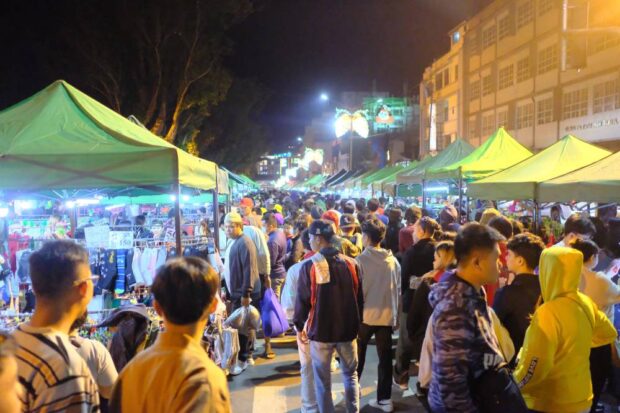Gastroenteritis outbreak not yet over, says Baguio mayor

NOT SCARED | Despite a diarrhea and acute gastroenteritis outbreak in Baguio City at the start of January, visitors continued to flock to parks and other tourist spots in the summer capital, as shown in this photo taken this week at the city’s popular night market. (Photo by NEIL CLARK ONGCHANGCO / Inquirer Northern Mindanao)
BAGUIO CITY, Benguet, Philippines — Stronger regulations and more testing will be enforced on commercial wells and water-refilling stations serving the summer capital, given the stomach flu outbreak at the start of the year, Mayor Benjamin Magalong announced on Sunday.
Acute gastroenteritis (digestive inflammation) and other diarrheal ailments, which may have infected up to 3,087 people as of the latest tally of “self-reported” cases, are associated with contaminated water or poor food hygiene.
But as of Sunday, only three gastro cases have been recorded by the city health services office, said Dr. Celia Flor Brillantes, city health officer, during a Jan. 14 afternoon briefing.
The epidemiological curve shows a sharp downtrend in infections since Jan. 9, indicating that the spread of the disease has been contained, Magalong said.
However, the mayor said epidemiologists “would need to identify the cause and circumstance of the gastroenteritis surge,” before the government can say the outbreak is over.
Article continues after this advertisementSanitation laws review
Magalong said the government is reviewing its sanitation laws and may incorporate stricter and upgraded testing protocols for private deep well owners and water purification facilities. There are 1,003 deep wells in Baguio but only 173 of these facilities have been licensed to draw water.
Article continues after this advertisementCouncilor Betty Lourdes Tabanda, chair of the committee on health and environment, said an association of water-refilling stations has been strict about complying with periodic water quality tests, “but not all facilities are members of their organization and may have not followed mandatory test requirements.”
The review will cover the Environment Code of the City of Baguio (City Ordinance No. 18 series of 2016); Ordinance No. 54, which regulates the disposal of human waste; Ordinance No. 98, which requires households to connect to the City Sewerage System; and Ordinance No. 35, or the Septage Management Ordinance.
Magalong declared an outbreak on Jan. 10, following the rise of diarrheal infections during the Christmas and New Year’s Day break, and mobilized health workers, doctors and even policemen to gather water samples from food establishments that served the patients.
The latest test results confirmed the presence of fecal matter in 18 of 62 samples, 12 of which were from water delivery services, four from places that serve food and one from a household water dispenser. More results were expected from the Research Institute for Tropical Medicine by Jan. 17.
Self-limiting disease
A team from the Department of Health Epidemiology Bureau had been helping the city track down the sources of the contamination.
“It is likely [not caused by] food because the infections continued for sometime so it’s more likely [the result of contaminated] water,” said team leader Dr. Ian Christian Gonzales, who attended the briefing.
“Is it just from one place? As of now we are looking at the numbers and how spread apart [the infections are], so we can’t say for certain yet [where the outbreak emerged]. We are still doing our investigations,” he said.
Dr. Donnabel Tubera-Panes, the city epidemiologist, said new findings suggest part of the infections may have been transmitted by a virus. She said half of 10 stool samples from patients tested positive for the norovirus and the sapovirus, which are strains responsible for the common stomach flu.
Magalong said new tests were being conducted to determine how prevalent the norovirus and the sapovirus have been in the first days of January.
Stomach flu is an ailment common during the cold season and has affected countries with heavy winters like the United States and Canada, the mayor said.
But the stomach flu is a “self-limiting” disease, meaning patients recover in a span of three days with proper care and treatment, he said.
No effect on tourism
The outbreak has not affected tourism, gauging by the number of visitors who continue to flock to Baguio during the weekends, Magalong said.
More tourists are expected in this city in time for this year’s Baguio Flower Festival which is scheduled to open on Feb. 1.
Around 9 percent (about 277) of the 3,000 people who “self-reported” their diarrheal infections through a Baguio online portal were tourists, Magalong said.
Most of the first complaints emerged after they dined at restaurants, coffee shops and other food outlets at a popular shopping mall.
Magalong said the mall reported a 20-percent decline in food sales, in a period when it expected a 10-percent hike in profits because of the holiday.